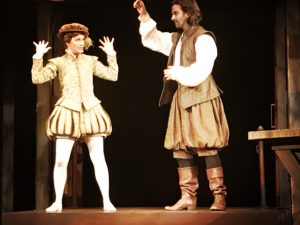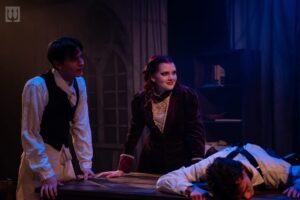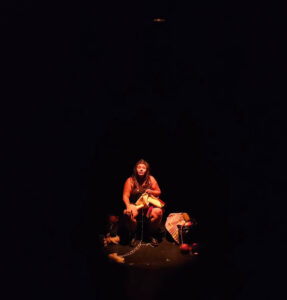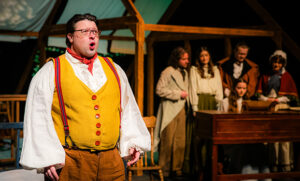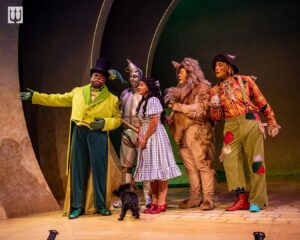sarah english & allister macdonald
Shakespeare in Love, the season opener of Neptune Theatre’s 56th Season, is the first show programmed by Jeremy Webb in his first full year as Artistic Director of Halifax’s regional theatre. With a cast of sixteen local actors, seventeen if you include Missy, the dog, it’s apt that Webb’s choice be a show that can be described as a love letter to the theatre.
Shakespeare in Love was adapted for the stage by Lee Hall from the screenplay for the film (by Marc Norman and Tom Stoppard) of the same name, which won seven Academy Awards in 1999. Sarah English, who plays Viola de Lesseps in the play, says that the biggest difference between the play and the film is its emphasis on the ensemble. “Yes, it’s a love story,” she says, “but I think in highlighting the ensemble in a much stronger way, it allows for each actor in the show to have more opportunity for fun and for comedy. I think audiences are going to walk away from the show thinking, “That was a lot funnier than I expected.” Jeremy Webb, who directs the show, admits he watched about twenty minutes of the film while reading the script initially, “just to get the characters straight because there are so many characters.” Once he got the flavour for it, he turned it off and focused entirely on the script for the play. “What I did was I cast a really strong ensemble of people, and local talent, some of whom haven’t been on the Neptune stage before, some who haven’t worked here in ten or fifteen years, and so it’s a bit like Homecoming Week. The cast is really pulling out all of the stops. It’s pretty dynamic.”
Allister MacDonald plays Will Shakespeare. He stresses that fans of the film will see the same story, with some of the same iconic images from the film, but they will also find new elements to enjoy. In explaining the journey of his character in the play MacDonald says, “The show explores William Shakespeare’s “Lost Years,” this period in his life before he was well respected, and before he wrote the plays he is now most well known for. It’s a fictionalized story of Will having writer’s block, he’s left his wife and his kids in Stratford, he’s fighting to be heard and inspired as an artist, and then he meets and falls in love with a young lady named Viola de Lesseps. She just so happens to be an actor who auditions for him, in disguise as a man, and he falls in love with that actor’s work, without knowing that it’s the same person that he’s fallen in love with as well. So, because of that flood of inspiration, he writes Romeo and Juliet, based on his interactions with Viola. The film was praised for being a wonderful celebration of the theatre, and I think that’s only heightened by having the story told on stage.”
Webb agrees, “There’s nothing like seeing it live. You’re sitting a few feet away from the dog… or from Shakespeare.” For audiences, they have the opportunity during this show to get a peek behind the scenes. As Webb explains, some of the superstitions, traditions, the auditions, the rehearsals, and the “showmances” are an accurate depiction of what life in the contemporary theatre can be like. Some elements depicted in Shakespeare in Love are unique to the past. For example, as Webb says, Viola having to dress up as a man in order to be an actor is historically accurate, as women in the Elizabethan period were prohibited from working in the theatre, “We see men playing the female roles in the play within the play. We have slightly older actors playing boys of a certain frame or stature who would have played the women in Shakespeare’s plays, so that they could portray female characters in these plays. We’re not doing these scenes for laughs. That’s the way theatre was performed in this time. So, when Viola arrives and has to dress up like a boy, much younger than herself, in order to play a women, you really see the double whammy she faces. It’s really interesting seeing Viola’s struggle, because she is trying to be recognized as an artist, but as a women she is not allowed on stage at all, so to have her performing in this play is highly illegal and would result in the theatre being shut down. In today’s society, even hundreds of years later, we still see women in the theatre trying to have their voices heard and to be seen.”
English stresses that Viola is driven. “It’s a lot of fun getting to play a passionate, driven female character,” she says, “I think it’s easy to gloss it over and say, ‘Oh, she’s the ingenue.’ But that’s not it. She is very brave and very driven. She knows she could get in a lot of trouble for acting in this play, but she HAS to do it. Even as the risks and the danger are building up, one of the beautiful things is that there’s no question about her not doing this show. There are romances where she is going, ‘I don’t know if I should or I shouldn’t…’ but there’s no doubt, she is going to be in that play. That’s fun for me to play. She is an artistic free spirit.” English continually discovered more about Viola’s character as her various costume pieces and wigs fell into place. She has six or seven different looks, and sometimes she only has forty seconds to get from one to the other. “Once I’m wearing the clothes for Thomas Kent (the name Viola uses while in disguise) I’m aware that I can suddenly run around and move. That’s another element to Viola wanting that freedom that I can relate to. She’s a tomboy. Even though our costume designer has made the dresses beautifully, and taken lots of care to make sure that I can move in them, it’s just the size of them. Kent’s clothes are more comfortable, and I’m aware that that would have been what Viola was feeling as well in that time.” MacDonald only has one costume change, and it happens on stage: his vest goes on and then his vest comes off. This is highly symbolic of the gender politics of the Elizabethan era as well.
Webb emphasizes that audiences don’t need to know anything about William Shakespeare or Shakespearean text in order to enjoy Shakespeare In Love. “Just come and have a good time watching a play about two young people- artists- meeting and falling in love and the chaos that ensues when they do what they’re not supposed to do.” English says that all the references to Shakespeare’s life and work are like Easter Eggs, “if you don’t catch them, you’re not missing anything, but they’re something a little bit extra for those in the know.”
I didn’t get to chat with the real star of the show, Missy, a miniature American shepherd who is making her Neptune debut. She has the star dressing room, and as English says, “It’s great to have her backstage. I’m a dog lover, so I just love hanging out with her- not during the show- but between shows. She just chills everybody out.” MacDonald agrees, “Her trainer, Élise Saint-Pierre, is a cool, calming presence as well, and I think that translates to the dog. They’ve both really become extra cast members.”
As the Elizabethan Producer Philip Henslowe says during the show, “Comedy! That’s what they want! Love! … and a bit with a dog!” It looks like Shakespeare in Love is all set.
Shakespeare In Love opens tonight, September 7th, 2018, at Neptune Theatre’s Fountain Hall Stage (1593 Argyle Street). The show runs until October 7th. Shows are at 7:30pm on Tuesday to Friday and 2:00pm and 7:30pm on Saturdays and Sundays. Industry Night is September 11th, Talkback Night is September 12th and Relaxed Performance is September 23rd. For tickets and/or more information please CLICK HERE, Call 902-429-7070 or 1-800-565-7345 or visit the Box Office at 1593 Argyle Street.
Follow Neptune Theatre on Social Media: Facebook. Twitter. Instagram (@NeptuneTheatre). Use #HfxInLove to help spread the word about the show.
Incoming search terms:
- Shakespeare in Love

